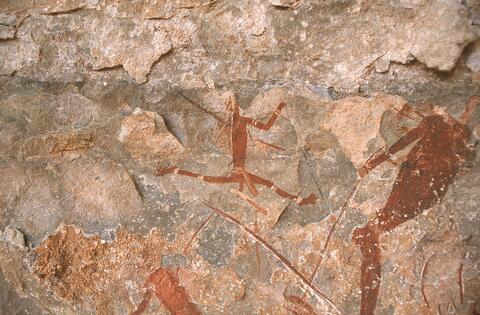Identity area
Reference code
Title
Date(s)
- 11/10/2001 (Creation)
Level of description
Extent and medium
Context area
Name of creator
Biographical history
Brief description of site: RSA BUL2 is an 18 m long, up to 4 m high and 8 m deep ocular cave-like space. The site is located on the 1 720 m contour and has light vegetation growing within the shelter.. There is a large, level floor area that makes this an excellent living space.
The floor is soft and may have considerable depth of deposit. The site is high enough not to be flooded regularly and has a high ash content, suggesting good preservation of organic remains, as is borne out by the good number of bone fragments visible. There is some grit-tempered, undecorated pottery - perhaps from herder's stays. There is also Historic period white crockery. In terms of stone tools, there are many present at this site. Most of these tools are made on fine-grained agate rocks known generally as crytpo-crystalline silicates or oplaines. Every stage of stone tool manufacture is present. There are cores - large lumps of rock from which stone tools are made. There are flakes - general-purpose cutting tools. Adzes are present and were used for woodworking in much the same way as a spokeshave. End and side-scrapers, often in the shape of a thumbnail were used to prepare leather. There are also rare burins and awls - used to pierce. These stone tools and the paintings show that this site was a long-term home and spiritual centre for Bushman communities.
Brief description of art: On the central portion of the site's back wall, in pulses over a 11 m area, are perhaps 250 individual Bushman rock paintings. These paintings show considerable conceptual unity and centre on the Medicine Dance (also known as the 'Trance Dance'); the most pivotal and enduring of Bushman religious ceremonies. Many of the dancing figures are animal-headed and hooved - and are called 'therianthropes'. Other human figures bleed from the nose and assume a range of striking body posture such as bending forward from the waist, lying prone, holding and hand to the nose, holding arms behind the back, dancing and so forth. There are numerous eland (Tragelaophus oryx) - some of which have been re-painted (which is unusual) and, interestingly, more than a dozen hartebeest (Buselaphus) - one of which depicted in rear perspective - as well as smaller antelope such as rhebuck (Redunca fulvorufula). There is a set of distinctive white human figures. Many of the human figures are shown running - some appear to be fleeing a rough red baboon-like 'monster'. Below one very complete rendering of a Medicine Dance with dancers, shamans with constricted waists and clapping people, an animal headed snake is shown as though emerging from a crack in the rock. There are some less fine human figures depicted in a bright orange paint.
Name of creator
Biographical history
Nationality: South African
Created by: willem
Created on: 11/03/2003
Name of creator
Biographical history
Repository
Archival history
Immediate source of acquisition or transfer
Content and structure area
Scope and content
Appraisal, destruction and scheduling
Accruals
System of arrangement
Conditions of access and use area
Conditions governing access
Conditions governing reproduction
Language of material
- English
Script of material
Language and script notes
Physical characteristics and technical requirements
Original size: 35mm

